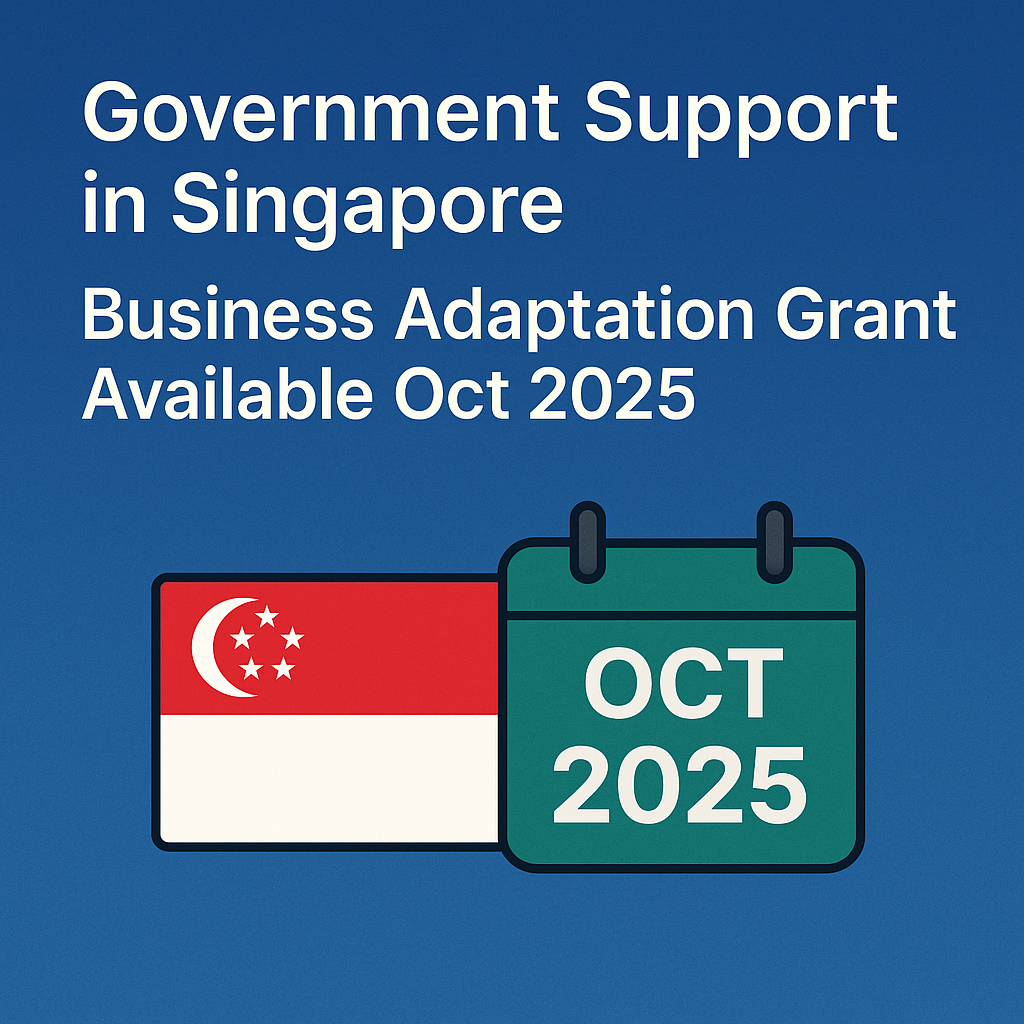Singapore’s new Business Adaptation Grant (BAG) launches in October 2025 to help exporters reconfigure supply chains. Learn how to pair it with trade finance.

The Business Adaptation Grant (BAG) is Singapore’s latest government initiative designed to help companies navigate global trade shifts and rising tariff pressures. Officially launching in October 2025, the grant provides up to S$100,000 in support for firms looking to restructure supply chains, diversify markets, or strengthen resilience in response to external shocks such as US tariffs or logistics disruptions.
The grant will run for two years, complementing existing Enterprise Singapore schemes such as the Enterprise Development Grant (EDG) and Market Readiness Assistance (MRA) program.
The new grant is timely for Singapore exporters facing challenges such as rising input costs, global tariff uncertainty, and supply-chain bottlenecks. Here’s how BAG can make an impact:
Exporters often need to pay advisory firms, logistics providers, or suppliers upfront when reconfiguring supply chains. BAG can subsidise up to 50%–70% of these costs, reducing out-of-pocket spend and making projects more feasible.
Eligible activities include supplier diversification, market entry research, and logistics redesign — key moves for exporters shifting away from over-reliance on a single region (e.g., China).
As trade tensions evolve, BAG helps companies invest in scenario planning, compliance reviews, and FTA advisory, ensuring they stay compliant and competitive across multiple export markets.
Launch date: October 2025
Duration: Two years (till 2027)
Funding cap: Up to S$100,000 per firm
Eligible companies: SMEs and exporters impacted by trade disruptions
What’s covered: Advisory services, logistics reconfiguration, diversification costs
Co-funding required: Yes — firms must pay part of project costs upfront
Administered by: Enterprise Singapore (with MTI oversight)
Even with government funding, exporters need working capital to start their adaptation projects before reimbursement arrives. Factorglobe’s digital trade finance tools can close that gap.
BAG disbursements often arrive after project milestones — meaning exporters still have to front advisory and supplier costs. Factorglobe’s invoice factoring converts receivables into instant liquidity so you can co-fund projects without waiting on payments.
Example:
A Singapore SME exporting electronics secures S$80,000 under BAG to diversify suppliers to Vietnam. The company must first pay consultants and inventory logistics costs. Factorglobe factors its existing invoices, unlocking S$60,000 in working capital — covering upfront costs while waiting for the BAG reimbursement.
Exporters starting with new overseas suppliers may need to prepay before production begins. PO financing from Factorglobe bridges that gap, ensuring continuity in supplier relationships and on-time project delivery.
Factorglobe’s SME finance advisors can help structure a combined plan — pairing grant funding with receivables finance, so exporters don’t face cash shortfalls mid-project.
Here’s a step-by-step checklist to act fast when applications open:
Company: Singapore-based precision equipment exporter
Challenge: Rising tariffs and logistics delays in key U.S. routes
Plan: Relocate component sourcing to Malaysia and Thailand
BAG funding: S$100,000 approved (70% coverage of project costs)
Factoring: S$120,000 in receivables financed through Factorglobe to pre-fund supplier deposits and consultant fees
Outcome: Supply-chain shift completed in 90 days, no cashflow disruption, faster export turnaround, and margin recovery of 6%.
Q: Who can apply for the Business Adaptation Grant?
A: Singapore-registered companies affected by tariff or trade disruptions, including exporters and manufacturers.
Q: How much support can SMEs receive?
A: Up to S$100,000 per company, with SMEs eligible for higher co-funding ratios.
Q: Can BAG be combined with EDG or MRA?
A: Yes, provided there’s no overlap in cost coverage. BAG complements EDG and MRA for exporters.
Q: How does factoring fit into this?
A: Factoring provides immediate liquidity so you can pay suppliers and advisors while waiting for BAG reimbursement.
Ready to Diversify Your Supply Chain?
The Business Adaptation Grant opens in October 2025 — be ready to act on day one.
👉 Contact Factorglobe for a 20-minute consultation on how to structure your grant + finance plan.